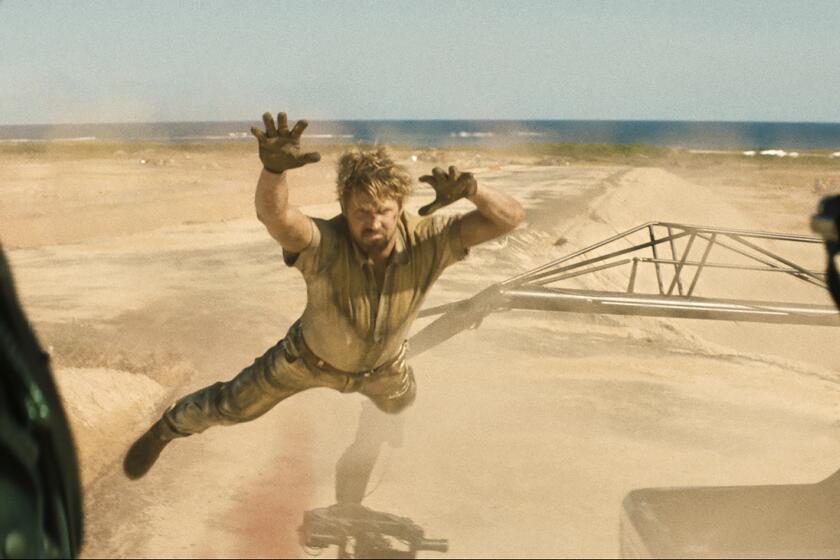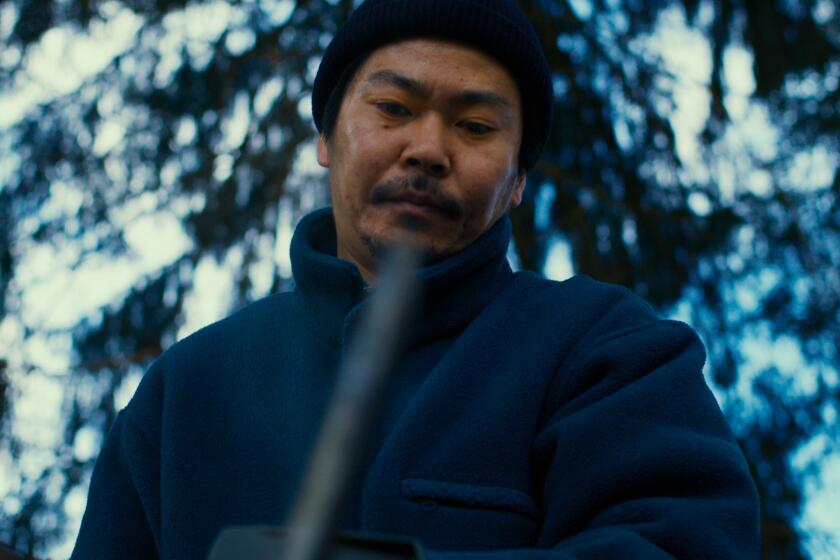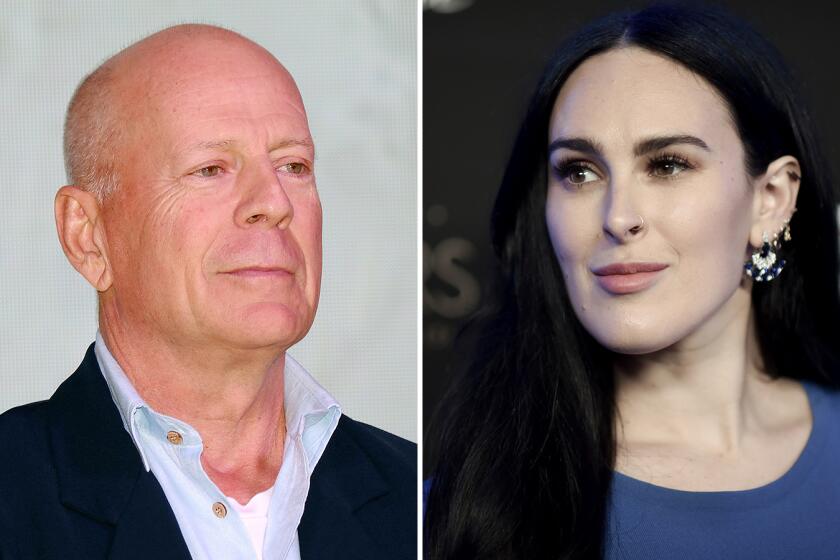Jason Reitman firmly at the controls in ‘Up in the Air’
Jason Reitman is the first to tell you that he’s an “aisle.”
He prefers sitting in an aisle seat on an airplane, which is relevant because his new film, “Up in the Air,” in theaters Friday, is shot extensively on planes and in airports. It details the life of urbane corporate-downsizing expert Ryan Bingham (George Clooney), who flies around the country firing people and studiously avoiding human connection.
For Reitman, an aisle is never just an aisle or a preference for legroom but an actual psychological tag, which he describes as “selfish.” Picking the aisle says you “need to be in possession of your destiny,” he explains. “You need to be in control and freedom is important.” Conversely, if you’re a window, like Reitman’s wife, Michele Lee, “you are selfless.”
The 32-year-old writer-director has clearly spent a lot of time thinking about the emotional geography of air flight, almost as much as his cinematic protagonist who rhapsodizes about “airworld” with its “dry, recycled air” and “aura-sapping artificial lighting,” as Walter Kirn writes in the novel from which the film is adapted. Reitman spent six years -- on and off -- writing the script. He delivers the “aisle” metaphor smoothly and engagingly as he sits in a banal leather chair, in a cavernous but impersonal airport hotel near LAX.
Reitman projects a pleasant intensity, focused but loose, with longish hair tossed behind his ears. It’s hard not to feel as if you’re in the hands of a polished director who has orchestrated this moment just so. The meeting place is of course thematically appropriate to the film, and the aisle-seat insight, he explains, came out of a conversation he had with NPR host Terry Gross a few hours before.
And there are the props. Reitman, who’s been dutifully bounding around the country talking up his film, has actually made a pie chart, via an iPhone app, that he’s posted on his Twitter page. It chronicles the kinds of questions asked to him by journalists, with the majority of them about Clooney, then the film’s take on the economy, and so on and so on.
The conceit may reflect the routinization of entertainment journalism, with its mass junkets where reporters ask similar questions to directors and stars hawking their films. Reitman blithely insists his little chart isn’t belittling to journalists, deeming them interchangeable drones, but just a reflection of the rote quality of the interviews. Ironically enough, Reitman’s cheerful, scripted depersonalization of people is precisely what “Up in the Air” protagonist Bingham practices as he jets around America laying off bewildered workers. The fun-house effect is further amplified because most of the reporters flocking to speak to Reitman are no strangers to layoffs, survivors in an industry hit hard by the recession and changing times.
The interview gets very self-referential very quickly, and what saves Reitman from coming off a clueless schmuck with this particular stunt is a kind of winning humanity, present both in person and in his films. With three movies under his belt, Reitman is fast becoming a voice of his generation, a cool-eyed ironist with a disdain for easy moralizing, who invariably gives a Capra-esque kick to characters who could be construed as jerks (a tobacco lobbyist in “Thank You for Smoking,” the corporate grim reaper in “Up in the Air”) or situations ripe for disgust, dismay, or cheap moralization as in “Juno,” for which he was nominated for a directing Oscar.
Reitman loves to purposely disrupt well-worn platitudes. “I’m just contrary,” he says. “I want to take an open-minded point of view on someone that is normally vilified.” He quotes “Thank You for Smoking,” Christopher Buckley’s book that was the source material for his first movie: “If you want an easy job, go work for the Red Cross. If you want a real job, go work for Big Tobacco.” I have always kind of seen something in that, like making ‘The Insider’ is easy, right?” he says, referring to the 1999 Michael Mann film about a corporate whistle-blower who exposed the tobacco companies. “It’s like Big Tobacco is evil. Wow, what a statement,” he adds with a smirk.
In “Up in the Air,” Reitman dives head first into one of the most wrenching developments of the day -- joblessness -- particularly among white-collar workers. Already, the film has won over audiences at the Telluride and Toronto film festivals and has distinguished itself as an early awards-season favorite. While there are multiple termination scenes, the film is actually the story of the suavest misanthrope on the planet, “a guy who believes in the idea of living alone with nothing, and that this is an acceptable way of life,” Reitman says. Enter two women who disrupt this existential solitude: Vera Farmiga as Clooney’s no-strings-attached love interest, and Anna Kendrick, an officious go-getter, whom Clooney is ordered to take around the country on his firing missions.
Taking it personally
Reitman insists that “Up in the Air” is his most “personal film to date,” noting that he tends to identify with his films’ immature male character. Bingham’s vision of a commitment-free life is weirdly entrancing, he explains, even to someone like him, who has basically had two long monogamous relationships and is now happily married with a child. “I have no fear of settling down, no fear of connecting,” Reitman says. “I have a job where I can do exactly what I want to do, and I have days where I want to be completely unplugged from everyone. I want to live in a city where I know no one and have nothing. Why am I exhilarated by that?”
“I think there’s something about the isolation and loneliness of the Clooney character that resonates for him,” says his father, Ivan Reitman, the ‘80s comedy titan who directed such films as “Stripes” and “Ghostbusters” and produced “Up in the Air.” “This leads to the ‘lone warrior’ thing, particularly if you’re a young man in his late 20s or 30s.”
One could imagine that growing up in the shadow of Reitman père wasn’t always easy, and that anonymity, or at least the idea of it, is freeing.
Jason Reitman was raised in Beverly Hills by parents who are still married and says that during his childhood he was more of a “window . . . a really quiet kid, just shy and embarrassed.” The first movie set he really remembers being on was 1984’s “Ghostbusters” but says “I basically was scared out of the idea of becoming a director. It was more just . . . ‘Why enter a profession where at my very best, I will live in his shadow, and at my worst I will fail on a very public level?’ ”
That changed after Reitman went off to Skidmore College in New York, ostensibly to become a doctor, but began flailing academically. His father came to visit, took him out to a diner and told him the line that his father, a successful businessman, had told him back when he was in college and contemplated opening up a submarine sandwich shop. “You need to find something with more magic in it. You have to follow your heart, and being scared is not the reason not to do it.”
Within a month, Reitman had returned to L.A. and talked the dean of USC into letting him transfer to the university, where he studied creative writing with T.C. Boyle. He earned the money for his first movie by designing and selling desk calendars to his fellow students, raising the princely sum of $8,000, which his parents then matched, allowing him to make his first short, “Operation,” about organ thieves. He entered it on the festival circuit, that “Darwinian process that everyone else goes through, so I would know, for me, that I had my own career for a reason.”
The family business
Reitman is exceedingly close to his father, who he calls his creative consigliere. He had in fact first pitched “Up in the Air” as a project for his dad to direct in 2002, when he couldn’t get his first film -- “Thank You for Smoking” -- financed. His father’s company, Montecito Pictures, bought the film rights to the book and developed various screenplays, none that worked until the younger Reitman took the reins. In the end, Montecito Pictures put up half the financing for the $25-million film (distributed by Paramount).
While working on the script, Reitman wrote specifically with Clooney in mind as his lead, a man who journeys toward an unexpected satori. Indeed, Bingham uncannily fits Clooney’s tabloid image of a lady’s man unwilling to commit.
“I was aware when I read it what the parallels would be to others’ perceptions of me,” Clooney explains during a recent phone interview. “But if you’re going to do it, this is the best version of it I’ve ever read. There are some movies where there’s only one person that’s right to play them, and I looked at this one and thought, ‘I’m probably about the right guy to play this one.’ The only reason not to do it would be out of some sort of fear.”
As it turns out, Clooney knows joblessness intimately, and he infuses his termination scenes with a deep sense of compassion. “I grew up in Kentucky. My father [journalist Nick Clooney] has been fired 10 times,” he explains. “We would go from somewhere really nice to a trailer to a decent house to living with relatives. I’ve been fired myself. I have a great understanding of it.”
Unlike his film’s star, however, Reitman has never been fired or known economic insecurity. His first stabs at the layoff scenes were by his own admission inauthentic and bad. He remedied that during pre-production in St. Louis by putting out a call for the recently unemployed to come for a documentary on job loss (when they arrived, they were told it was really for a feature film). With Reitman watching on a monitor, an interviewer was asked to “fire” the applicants, and for them to respond just as they had when it had happened to them in real life. When the laid-off workers heard the boilerplate legal language, “you would see them change,” recalls Reitman. “It was sense memory and they didn’t know what sense memory was. They were just doing it, and they would slump, and their eyes would turn. One girl broke into hives.” Twenty-two of these people ended up in the film.
While some might construe using the real pain of joblessness for a fictional movie as exploitative, for Reitman, the top priority is getting it right, whether it be the acting, the look, the music or, particularly, the ironic tone, which he deems crucial to the success of his movies. “I deal with subjects that have to be dealt with with precision, because if you step out of the lines, everything crumbles,” he says. “If you felt that I had some sort of moral opinion on the subject, even for a moment, the whole thing deflates, like it loses its value and then its importance.” A look of true revulsion flits across his face. “All of a sudden it becomes a message movie, instead of a kind of complex human narrative.”
rachel.abramowitz@
latimes.com
More to Read
Only good movies
Get the Indie Focus newsletter, Mark Olsen's weekly guide to the world of cinema.
You may occasionally receive promotional content from the Los Angeles Times.






